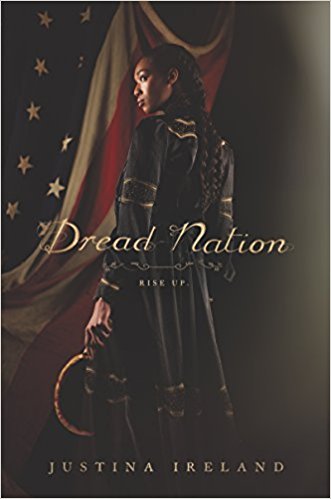Sometimes, and not on purpose, a book will just migrate its way down my TBR pile. It’s inevitable, I suppose. There’s an endless supply of both shiny new titles and neglected classics, and I can only read so many books at a time.
Fortunately and unfortunately, I got to Dread Nation before too much time had passed since its release date. Unfortunately because now I have to wait a really long time for the sequel. Fortunately because of basically every other reason, including but not limited to: this book is awesome, it’s amazing, it’s insightful, it’s emotional, it’s gripping, etc.
At first I thought the premise was a little excessive. The Civil War is already a miserable, horrifying period—why add zombies? But it works. Done right, zombies are the best monsters for highlighting social injustice and social change (see also: Romero). And oh is this done right. Justina Ireland is a mad genius.

When the zombies rose from the battlefield, the Civil War took a strange turn, as both North and South had to stop fighting each other and start fighting the people they thought were dead. Though slavery was ended and the nation remained united, the undead remained a persistent threat, and little else changed. Instead of the Confederacy there are the Survivalists, white conservatives who believe in a Jim Crow utopia for themselves (dystopia for everyone else, of course). The Egalitarians believe in greater equality, but they aren’t much in evidence in Baltimore, which prioritizes safety over freedom. The hordes of undead are far from defeated, and the Survivalist mayor has a new plan for how to keep the dead—and the nonwhite citizens—down. One of whom is our narrator, Jane.
Jane is the black illegitimate daughter of a white plantation owner, and she’s seen some painful things. Children devoured by the dead, adults risen to kill her, and all of it barely worth mentioning compared to the racism and restriction of Survivalist Baltimore. I burned with anger on Jane’s behalf for the indignities and abuses she suffered, and her triumphs offered me something that’s been in short supply lately: just a glimmer of hope. Not in her fighting skills, although those are impressive, but in her absolute dignity and self-worth. She never gave up on herself, on her humor, or on her fury.
In post-Civil War Baltimore there’s a lot to be furious about. Jane is a student at Miss Preston’s School of Combat, one of the many schools founded to educated Native American and African American children to defend wealthy whites. The children are forcibly removed from their homes at age 12 and can be hired after graduation to be personal bodyguards–which is to say, they can be first in line to face the hungry dead. You would think that a plague of undead would make people value life, but for the wealthy and powerful, the undead only serve to illustrate the ways in which the powerful can refuse to see others as people. At one point, a white man refuses to distinguish between a black girl who has been bitten and one who has not. Pointed commentary indeed.
Jane and all Miss Preston’s girls are trying to find a way to survive this, but they have very different ideas of what survival and success look like. I loved the dynamic between Jane and Katherine, which was delightfully persnickety at first. Jane has a casual relationship with the truth and with rules, while Katherine is top of her class in decorum as much as fighting. Jane loathes her too-long dresses; Katherine secretly wears corsets, loving fashion more than function. In less capable hands they might have been tropes, but Ireland consistently shows us new facets and depth to both of them, and to many secondary characters besides.
I also deeply appreciated the attention given to racial passing, which provides not one but two crucial hinges on which the story turns. Jane is black; Kate is also black, but with golden hair and fair skin, she is repeatedly mistaken for white. Both are punished for the way they look (almost as if illusions of racial superiority are fragile and self-contradictory nonsense!), but both find ways to use the system to their advantage, even if it means disguising their talents and intelligence. In such a fraught world, resistance is complex. Ireland gives a good deal of thought and nuance to each decision her characters make, always making sure the audience recognizes the negotiation between survival and freedom.
There is some low-key LGBTQIA representation revealed late in the book, which I appreciated not only for its own sake, but because it really drives home how essential intersectionality is to any conversation about diversity and justice. Blackness, womanhood, and desire are all volatile categories in Dread Nation, and Jane and Kate struggle to define them for themselves, rather than having someone else provide the definitions.
Speaking of definitions, it’s time again for me to point out that SFF YA is saying so, so much that’s pointedly relevant to today’s problems but is still struggling to be taken seriously. When I told a friend I was reading it, she laughed when I described it as “a take on racial tensions in the civil war from the perspective of a young black woman in an alternate history with zombies.” It was the zombies part that made my friend giggle, and it made me tired. Fantastical elements are still not taken seriously unless you sidestep the genre (see: Margaret Atwood, David Mitchell), but there’s so much power and insight in this book. Don’t put it off, and definitely don’t miss it.
